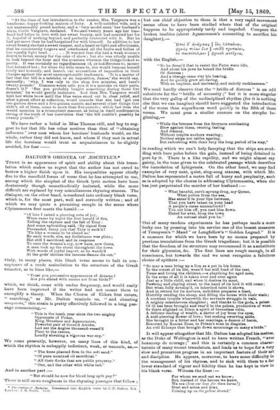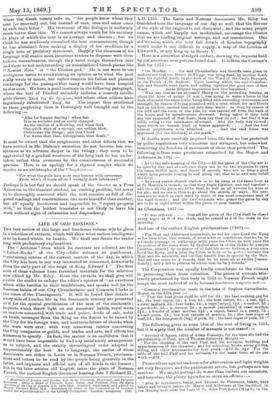DALTON'S OHESTEA OF /ESCHYLUS.* THERE is an appearance of spirit
and ability about this translation which makes us regret that the author has not cared to bestow a higher finish upon it. His inequalities appear chiefly due to the manifold forms of verse that he has attempted to use, among which the simplest of the Greek lyric metres have been dexterously though unmethodically imitated, while the more difficult are replaced by very miscellaneous rhyming stanzas. The dialogue, on the other hand, is rendered into ordinary blank verse, which is, for the most part, well and correctly written ; and of which we may quote a promising sample in the scene where Clytemnestra first meets the herald :—
"Of late I raised a piercing note of joy, When came by night the first herald of fire, Telling the capture and the fall of Troy : And some upbraiding said, 'By signal fires Persuaded, fancy you that Troy is sackl? 'Tis like a woman to be elated so.'
By such words, sirs, my foolishness was plain ; But still I sacrificed, and in response To ours the woman's cry, now here, now there, A man took up the shout throughout the town With words of joyful import, as he watch'd At the gods' shrines the incense-flames die oat."
Only, in many places, this blank verse seems to halt in con sequence of a crude assimilation to the structure of the Greek erimeter, as in lines like,—
" Trust you persuasive appearances of dreams ? Are you elated with omens not from birds?"
which, we think, come with undue frequency, and would easily have been improved if the writer had not meant them to exemplify a theory. When the Chorus of Elders first enters, " marching," as Mr. Dalton reminds us, " and chanting anapaests," this strain is pretty effectively followed in a long passage commencing,— We come presently, however, on many lines of this kind, of which the rhythm is unhappily indistinct, weak, or uncouth, as;
And in another part :— " But should he now for blood long spilt pay?"
There is still more roughness in the rhyming passages that follow ; but our chief objection to them is that a very rapid movement seems often to have been studied where that of the original happens to be appropriately tardy and impeded. Compare the broken iambics (about Agamemnon's consenting to sacrifice his daughter),— with the English,— We need hardly observe that the "bridle of distress" is an odd substitute for the "bridle of necessity ;" but it is more singular that the very gallop of the undisciplined rhythm (for it is nothing else that we can imagine) should have suggested the introduction of the worse than superfluous word quickly in the fifth of these verses. We must pass a similsr censure on the strophe beginning,— in reading which we can't help fancying that the ships are scudding with bare poles before the gale, instead of being detained in port by it. There is a like rapidity, and we might almost say gaiety, in the tone given to the celebrated passage which describes the immolation of Iphigeneia. On the other hand, we may find examples of very neat, quiet, sing-song stanzas, with which Mr. Dalton has represented a metre full of hurry and perplexity, such as is adopted by the chorus in addressing Clytemnestra, when she has just perpetrated the murder of her husband :— " What baneful, earth-sprang drug, my Queen,
What potion from the sea, Has enter'd in your lips between, That you have taken on your head A people's curse unnumbered?
You cut him off, you cast him down.
Hated for ever, from the town An outcast shall you be."
Out of many random experiments he has perhaps made a more lucky one by pressing into his service one of the lament measures of Tennyson's " Maud" or Longfellow's " Golden Legend." It is a measure for which we have been by no means prepared by previous translations from the Greek tragedians; but it in possible that the freedom of its structure may recommend it as asubstitute for their glyeonics, &c. The first lines are rough enough, in all conscience, but towards the end we must recognize a felicitous choice of epithets :— " So may a man bring up a lion as a pet in his home,
In the outset of its life, wean'd but still fond of the teat, Tame and loving the children,—a plaything for aged men, In the arms of all it is taken over and over again Just as a little child, and when it desires its meat, Fawning and playing about, to the hand of ita lord it will come; But when fully develop'd, an inherited taint it show., And in return for its nurture, unbidden prepares a feast, Horribly rending the sheep, and filling the house with their stain; A constant trouble wherewith the servants struggle in vain, A mighty mischievous slaughter ; and thanks to the gods, a priest
Of ill has been brought and rear'd in the palace, productive of woes.
So there alighted on Ilium a spirit of breezeless calm, A delicate darling of wealth, a darter of joy from the eyes; A soul-piercing flower of love ;`but erelong swerving aside, She brought to a bitter end her marriage, a demon of harm,
Escorted by %mien Zeus, to Priam's sons in disguise,
An evil Erinnys that brought down mourning, on naany a bride."
It will appear altogether that Mr. Dalton has adopted his metres, as the Duke of Wellington is said to have written French, "avec beaucoup de courage ;" and this is certainly a common characteristic of many recent translators, and leads ns to hope for a very slow and precarious progress in an important featured their art and discipline. He appears, moreover, to have some difficulty In the management of his rhymes, and to sink with them to a far lower standard of vigour and fidelity than he has kept in view in his blank verse. Witness the lines :— For whom we send out we know; But, instead of the heroes we knew, We see (how our love for them burns!) Dust and ashes and arms, Coming up on the yellow strand," where the Greek tersely tells us, "for people know whom they sent [or escorted] out, but instead of men, urns and ashes come to each one's house." His treatment of the dialogue is uniformly much better than this. We cannot always vouch for his accuracy
in plays of which the text is so corrupt and obscure ; but we think he has studiously consulted the best commentators, though he has abstained from making a display of his erudition by a single note or prefatory statement. Happily the clearness of his language will enable most incurious readers to dispense with these tedious encumbrances, though they must resign themselves here
and there to not understanding an unassimilated Greek phrase like " Xenian Zeus" or "the Ctesian god." He is not wont to use ambiguous terms to avoid risking an opinion as to what the poet really wrote or meant, but rather reserves his fullest and plainest
renderings for the passages that many would have been tempted to slur over. We have a good instance in the following paragraph, where the text of Dindorf unluckily includes a scarcely intelli
gible clause, xi ,rtc as, rgiiater, and where other editors have ingeniously substituted Mxicf", &c The import thus attributed to these perplexing lines is thoroughly well brought out in the
following:—
" Alas for human destiny! when fair
It is as variable and as easily changed As the outline of a drawing, and when dark One quick wipe of a sponge, one sudden blow, Obliterates the design ; and this I hold Far worse than that, unhappiness than death."
It must be owned that the roughnesses and other defects that we have noticed in Mr. Dalton's execution do not become less conspicuous as we advance deeper in the trilogy ; they seem to be
aggravated by a gradual weariness of the long task he has undertaken, rather than overcome by the consciousness of successful practice. Here is an apology for a rhymed couplet which we
receive in an antistrophe of the Choephorx:— " For what the gods hate none may honour with reverence; From which of these all do I wrongly draw inference?"
Perhaps it is but fair we should speak of the Orestea as a Pons Asinorum to the classical student, an exciting problem, but never to be thoroughly mastered while the text remains so full of dis
puted readings and constructions, one more beautiful than another, but all equally incoherent and impossible to "report progress with," so that the boldest translator is not likely to leave his work without signs of exhaustion and despondency.































 Previous page
Previous page